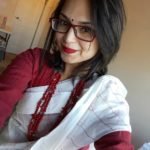Humayra Himel: Endeavors Of All Sorts
I am a Muslim, Indian-Bengali immigrant. I was born in a small town in Dinajpur. I am starting my MS in Biomedical Sciences and ultimately want to become a doctor.
Growing-up, I saw many villages where people did not have enough food, proper housing, education, or healthcare. One such person, who inspired my career path was my grandfather. He died from heart disease because of delays in getting proper treatment as he lived far from a hospital. Many people there can’t get the newest medications with fewest side effects, and there are less regulations; so people can easily obtain potentially harmful medications with drastic side effects. With the assistance of my degree, I will have a strong understanding of pharmacology. I hope to help my community by discussing the risks/benefits of their medications and how to use them safely. I can also work in research, synthesizing drugs and providing safer alternatives. In college, I did this, synthesizing sulfones and sulfoxides, which have applications as cancer treatments with limited or no side effects.
However, in order to achieve my dreams, I had a lot of barriers to overcome. One such challenge is that most women in my culture don’t have higher education. Another challenge is that my family and I moved to the US during high-school with little knowledge of English, American culture, and the educational system.
The first of these challenges was the way in which we immigrated. Unlike most people, we came to the USA by winning a contest. After 10th grade, my family and I went to a fair, where there was a contest to win a ticket to the USA. So, we entered the contest. We were not previously planning to come here, but three months later – on June 26, 2010 – we got a letter that we had won! We were completely surprised and had little time to prepare ourselves to come here.
Exactly one year later, after filling out many forms, having an interview, and completing all the requirements; my family arrived here. On that day, everything was completely new to me. It felt like a whole new world. So, at first, it was hard for us to get settled here. We didn’t have a car for the first 6 months, and we didn’t know anyone, but we had to depend on our community for help. Also, we were not really fluent in English when we arrived. When I arrived, schools were closed for summer break so, at first, I didn’t even have the chance to start communicating with or meet people my own age.
Then, once school started, I discovered how different the education system is here from at home. Here, we have scheduled testing all the time; and there are things to study for every week. At home, there were just three exams per year. I felt overwhelmed here. Also, here, classes are divided by level. At home, everyone who is the same age takes the same classes using the same curriculum. So, at home, if I had trouble with an assignment, there were lots of people I could ask for help. Everyone had the same assignments and books. Here, without standard assignments, my neighbors and friends were not be able to help me. Lastly, at home, you could get into medical or graduate school right after high-school. Admission to these programs was based-on your GPA and one standardized board exam. Here, you have to get a Bachelors first and pass a separate admission test for each program. Also, admission has additional requirements like research, community service, and other extracurricular activities. With all these differences, I felt lost at first.
In school, I was surrounded by new faces, but I felt invisible and found it hard to make friends. I felt like I would never be able to be like other kids who were born here. I also had trouble overcoming the language barrier. People judged me based on my different appearance and made fun of my accent. I felt really alone and hated.
I felt even more alone because I value family and family time, which is also different here. At home, everyone was always together. We left a really big family there, but here it is just me and my parents. Even with my parents, there is less time to spend at home together, because they have to work more often. They work is long days, and don’t have much time at home before needing to prepare for the next day. At home, everyone is done with work at 3pm. Luckily, here, I live my parents; and, at least on the weekends, there is free time to be together as a family. Thanks to them, even when I felt isolated in school, I decided I would not feel alone, because I had them and they were my positive energy. Also, as an only child, I set my mind to the fact that I have to do my best for my parents; and this also motivates me to do well.
When we first came here, I knew that I had to deal with these difficult situations. The Quran teaches that if something is going bad, it doesn’t mean Allah dislikes you. He is testing you. It teaches that when you go through pain, Allah will give you the strength to cope and make you stronger because of it. Allah teaches to always try our best. These teachings helped me to overcome the struggles that I had as a new immigrant; and eventually, I succeeded! I learned English, graduated high school, got my BS in Biology and am starting an MS in Biomedical Sciences. I did this by working hard, studying a lot, keeping my faith, and making the right choices. After facing hardships, I believe there is always something better for us and that there is always another opportunity waiting if we work hard and are determined to achieve it.


